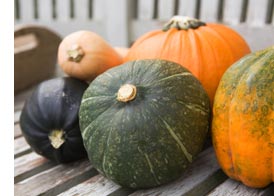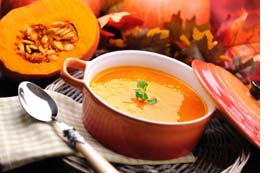Orange you Healthy?
- By Rebecca Taggart
- Last Updated On
- Reading Time: 3 mins.
The orange of autumn is not only on trees: November is the peak season for winter squash. Although remarkably varied in appearance, winter squashes share an orange-colored flesh rich in antioxidants and anti-inflammatory compounds. They are outstanding sources of vitamin A, plus provide plenty of dietary fiber, potassium, copper, and many B vitamins.
 Along with other orange vegetables such as carrots and sweet potatoes, squashes are full of carotenoids, which are strong antioxidants, and can impart colors to leaves and fruits that range from yellow to orange to red. Carotenoids have such strong antioxidant power that eating a wide variety of them in natural foods, such as fruits and vegetables, may reduce the risk of lung cancer, according to a study by the Harvard School of Public Health.
Along with other orange vegetables such as carrots and sweet potatoes, squashes are full of carotenoids, which are strong antioxidants, and can impart colors to leaves and fruits that range from yellow to orange to red. Carotenoids have such strong antioxidant power that eating a wide variety of them in natural foods, such as fruits and vegetables, may reduce the risk of lung cancer, according to a study by the Harvard School of Public Health.
Want farm-fresh fruit?
We've got you covered.Carotenes are a phytochemical subgroup of carotenoids and are responsible for much of the color in fall foliage, as well as the orange color of fruits and veggies. There are two main ones: Alpha-carotene (α-carotene) and beta-carotene (β-carotene). Beta-carotene is the most common form, and the precursor for vitamin A, an essential nutrient our bodies are unable to manufacture. A 2011 study found that people who had higher levels of alpha-carotene in their bloodstream had significantly lower death rates than people who did not. “These findings support increasing fruit and vegetable consumption as a means of preventing premature death,” concluded the abstract published in the Archives of Internal Medicine.
The carotenoid content of winter squashes is not their only claim to anti-oxidant fame. One cup of winter squash has 33% of the daily value (DV) for vitamin C, as well as around 22% of the DV for the antioxidant mineral manganese. The cell wall polysaccharides found in winter squash often include special chains of D-galacturonic acid called homogalacturonan, which one expert says recent studies have found has antioxidant, anti-inflammatory, as well as anti-diabetic and insulin-regulating properties.
A class of compounds called cucurbitacins and hexanorcucurbitane glycosides, first found in winter squash and therefore named for the species Cucurbitaceae, have effective anti-viral, anti-bacterial, and anti-inflammatory properties. These compounds have only recently been studied, and there is ongoing research investigating their benefits. There is evidence that they are effective against prostate cancer, and, based on less research, colon, breast, and lung cancers.
Get tips for your office
Be an office hero!

Yet another interesting nutritional benefit from eating winter squash comes from its anti-inflammatory omega-3 fatty acid content. One cup of squash yields about 14% of the DV for the omega-3 alpha-linolenic acid (ALA). Winter Squash is one of the few low-fat, plant-based sources of ALA, which is found in higher concentrations in walnuts and flax seeds, but along with many more calories. ALA is an essential fatty acid that the body needs for growth and normal functioning but cannot make itself.
Although pesticide use is usually low on winter squash, it is wise to purchase organically grown fruits. Squash plants are efficient scavengers of toxic pollutants from soil, including polycyclic aromatic hydrocarbons (PAHs), widespread organic pollutants derived from fossil fuels, which have varying levels of toxicity. Pumpkins, zucchini, and other squash are the plants of choice to remove soil contaminants in the process of phytoremediation, a technology that uses plants to remove toxins from soil, sediments, air, and water supplies.
Delicious winter squash can be enjoyed the same way you would a potato but with many additional nutrients: baked, roasted; as a side dish or a main meal. See Pumpkins: Not just for Halloween for how to make a puree from any squash. Visit The FruitGuys Almanac recipes and search your favorite squash name for easy and nutritious recipes.
Recent Articles
Meet Field Trip’s High-Protein, Low-Sugar Snacks for the Office
Nut-Free Snacks to Fuel Your Office—Now in a New Box!
The Best Fall Fruit: What’s Fresh for Your Office
How HR Can Boost Employee Morale With Appreciation Events (Ideas Inside!)
5 Office-Friendly Snacks for Hispanic Heritage Month
Subscribe to our Newsletter
"*" indicates required fields



